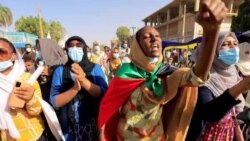On January 17, Sudan’s Ministry of Culture and Information issued a statement about the license of Al Jazeera Mubasher, Al Jazeera’s Arabic public affairs television network. Two days earlier, the government withdrew the license and revoked the accreditation of two Al Jazeera journalists.
The statement came on the same day that thousands of protesters marched to the presidential palace in the Sudanese capital Khartoum to demand a return of civilian rule after the military took power in October. Security forces used gunfire and tear gas, killing seven people.
The Ministry of Culture and Information claimed that Al Jazeera had broadcast scenes from the Sudan protests that included nudity, indecent language and scenes of out-of-control people behaving abnormally.
“The decision to withdraw Al Jazeera Mubasher’s license … came after many calls to its team to act professional, consider the public interest and stop broadcasting harmful content to the youth that violates the values and ethics of the Sudanese nation,” the ministry said.
But that is misleading. The move against Al Jazeera is part of pattern of suppression and censorship under Sudan’s military leadership.
The Sudanese Journalists Network (SJNet) said authorities have used verbal and physical violence against journalists, arrested some and destroyed equipment in media raids. “The ongoing suppression of journalists and media confirms the coup authority is trying to turn our country into a dark dot,” SJNet said on its Facebook page.
In November 2021, Sudanese security forces arrested the Al Jazeera’s bureau chief, El Musalmi El Kabbashi, after raiding his home. El Kabbashi’s arrest came a day after protesters took to the streets in Khartoum and the city of Omdurman. He was released after two days in custody.
On January 16, El Hadatha, an independent Sudanese newspaper, said it was forced to halt operations because of the increasing suppression of the media. The newspaper had paused its work in October to protest the military coup.
On January 13, Sudanese authorities raided the office of al-Araby TV, a UK-based independent broadcaster, and arrested its team, including journalist Wael Alhassan, supervisor Islam Saleh, cameraman Mazen Oono and his assistant Abu Baker Ali.
The channel’s management said the raid took place while the team was covering the anti-coup protests. Journalist Alhassan said tear gas was shot at them as they filmed the protests from the atop their office building. When they retreated, Sudanese soldiers were waiting for them.
“We were taken from the office, beaten and dragged to one of the army cars. They took us to one of the intelligence centers in the capital. We were beaten again, they covered our heads and broke our cameras,” Alhassan said in a televised interview.
Al-Araby issued a statement holding the Sudanese authorities responsible for its crew’s safety.
“The TV’s reporting is based on professional standards, and the entire team hold valid accreditation to perform their jobs without any issues,” al-Araby TV said.
Al-Araby’s team was released after few hours, and the security forces apologized.
On December 31, 2021, security forces in Khartoum raided the offices of Saudi-owned al-Arabiya and its sister channel al-Hadath, confiscating equipment.
“Sudanese security forces assault and beat the reporters of al-Arabiya, Lina Yacoub and Nizar Biqdawi, and assault and beat photojournalists and producers,” al-Arabiya tweeted.
The attack coincided with another major anti-coup rally calling for civilian-led rule. Sudanese security forces opened fire on protesters, killing at least four. Al-Arabiya team said earlier that day they were prevented from reporting on the protests.
Also in December, military authorities ordered Sally Othman of Saudi Arabia’s Asharq News to stop reporting live from the protests. While she was on-air, she paused and told viewers: “Pardon, I will not be able to continue this reporting, the authorities just prevented me.”
Security forces held and questioned Othman and her colleague, Maha al-Talb, for hours at the channel’s office in Khartoum, where they cut the channel’s internet and phone lines.
The channel’s management expressed concern for the safety of its journalists and held the authorities the responsible for their safety. The two were freed the following day.
Security forces also attacked RT (formerly Russia Today) photographer Mutawakel Issa while he covered the protests. Issa was beaten unconscious, and his camera and phone were taken.
In November 2021, Reporters Without Borders (RSF) said Sudan’s military authorities were continuing to target journalists who criticized the military. “Now controlled by the military, the state-owned media are carrying propaganda praising the armed forces and attacking the coup’s opponents,” RSF said.
Al-Araby al-Jadeed, a London-based pan-Arab media outlet, reported in October 2021 that following Sudan’s military coup, local media outlets received orders to stop any independent broadcasting and to bring programs in line with the army-controlled state media.
RSF's 2021 World Press Freedom Index ranked Sudan 159 out of 180 countries. The country scored a "not free" 17 out of 100 on Freedom House’s 2021 global freedom index.
Pro-democracy protests erupted in Sudan during an economic crisis in December 2018. Protesters called for the resignation of Sudan’s then president, Omar al-Bashir, a former military officer who ruled Sudan for three decades.
Amid escalating unrest, the military removed al-Bashir in 2019 and declared a state of emergency. The pro-democracy movement continued to demand a civilian-led government. A transitional government was formed under the joint leadership of Sudan’s top military official, Gen. Abdel-Fattah Burhan, and Prime Minister Abdalla Hamdok.
But in October 2021, the military wing seized power, dissolved the transitional government and arrested Burhan’s rivals in the government, including Hamdok. The military’s power grab came just before it was set to hand over power to civilians.
Hamdok was later released, and he reached a new power sharing agreement with Burhan, but the pro-democracy movement has resisted the arrangement. On January 3, Hamdok resigned, leaving the army in full control of the country.






